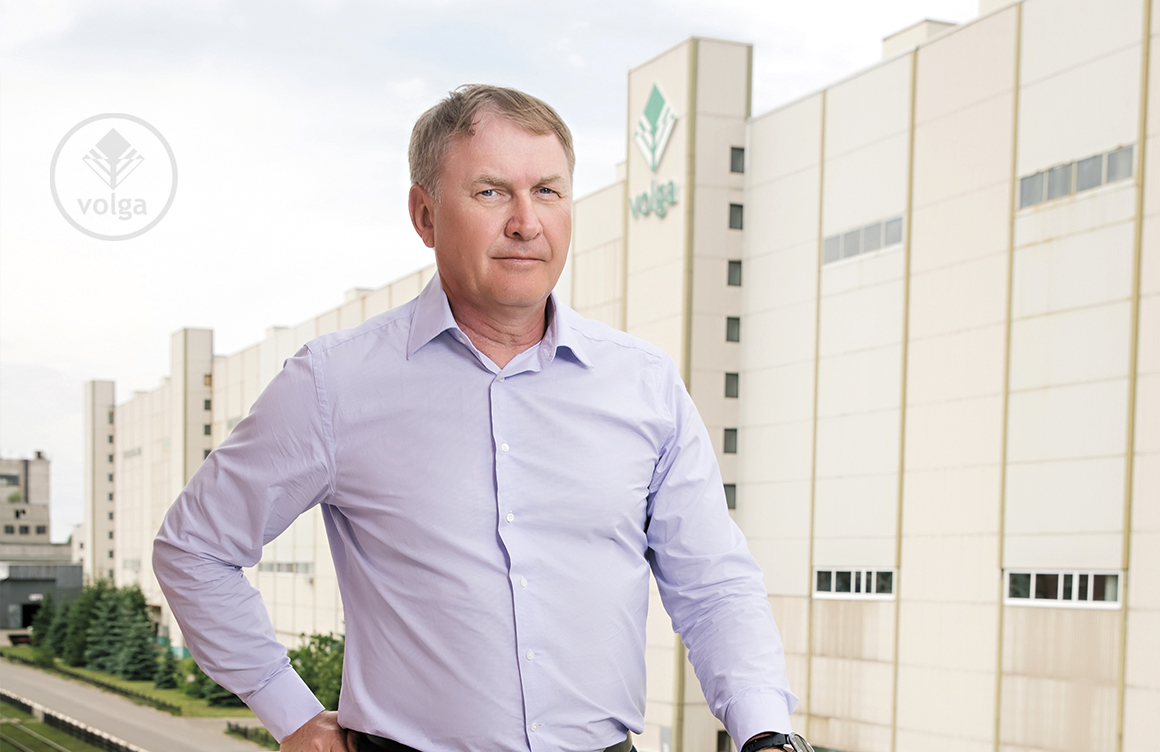6 July 2023

Sergey Iosifovich, the priority of the Volga's development strategy until 2028 is to diversify its product portfolio and raw materials production. How will the Сompany's product line change?
the Volga's product line has already changed. Over the last four years, we have added a fairly large range of packaging papers, and today our portfolio is approximately 50/50 newsprint and packaging paper. In addition to this, several development phases have been developed. The first is the modernization of the paper machine, which was shut down a few years ago, in order to retrofit it to produce quality testliner and fluting for corrugated packaging. Our plans have been slightly adjusted due to the current geopolitical situation, but today we are quite confidently moving forward with this project realization and will be ready to launch the paper machine in 2024.
When Volga creates a new product, how does it happen? Do your technologists carry out benchmarking - do they take the best market samples as a basis? Or do they stick to the requirements of GOSTs and Technical Specifications?
All the above mentioned. We are certainly looking at best practices. "Volga is unique in that we produce packaging paper from thermomechanical pulp (TMP). We are pioneers in this market. On the one hand, this is a disadvantage because there are no established practices, but on the other hand, it is an advantage because we are proving that it can be done. We have done a lot of work with equipment suppliers, conducted tests, even made a big study on a pilot machine, on which we simulated the process of making paper from TMM and waste paper. In this, we found the optimal solution. This is our R&D project, which we executed two years ago, before we approved the modernization project.
We also use the practices and experience of those companies that are willing to provide their facilities in order to test different types of papers and technologies. And, after having worked out the technologies, we turn to the equipment manufacturer to integrate this equipment into our paper machine.
Volga plans to achieve high efficiency levels by increasing the productivity of existing equipment, as well as modernizing it and commissioning new facilities. What production lines are you planning to modernize?
A paper machine, an energy sector. Today we are not dependent on external suppliers and provide ourselves with electricity, steam and heat. We are building a new condensing turbine with a 27 MW generator, and additional capacity will be provided by our electricity. We are also planning to launch a waste paper recycling line; waste paper will be an additional raw material for us to the TMM we produce ourselves, and this line will allow us to increase our productivity by almost 50%.
Volga is an environmentally oriented company. Tell us about your environmental policy.
Four years ago, we decided to conduct additional research using the competences of both Volga's specialists and engaged experts. We assembled a large team of experts to develop a programme to reduce the environmental impact. It consists of two components: the first component is to reduce the impact from incoming wastewater, and the second component is to modernize the treatment facilities to increase the efficiency of wastewater treatment. We developed the programme, adopted it at the Board of Directors in 2020 and now we are in our third year of implementation.
What difficulties and pain points do you see in the pulp and paper industry now?
Investments. Pulp and paper is a very capital-intensive industry, and it requires large investment resources, a lot of equipment that needs to be modernized and constantly maintained. Due to the fact that this is Western equipment and our enterprises are mainly built on it, today we face a new challenge - to find the same equipment in the East, to find specialists. For many years, we have been developing jointly with our former Western partners, who developed certain capacities for us: engineering, research, service, which overnight simply disappeared. Imagine that the entire industry, which was dependent on this, was left alone virtually with a Chinese manufacturer. This is a major challenge that we will have to overcome in the coming years.
How to overcome them, what can help?
It largely depends on different companies and on the state. The role of the state is now significantly increasing in consolidating knowledge, information, and relations with the Chinese business community, because whether we like it or not, today China is an equipment manufacturer and a huge market for us. China, among other things, may be interesting from the point of view of investment resources.
What development prospects do you see for the pulp and paper industry?
We have a good base, we have some time to form a new investment platform. The future of the pulp and paper industry is about investment, it is always necessary to modernize, to improve the product line, the production costs, and this is a lot of money, we need serious investment for this. The future is to develop new strategies based on the realities of today, and the realities are that those who used to be our main suppliers of equipment, spare parts, and consumables, they are not now.
The industry was in survival mode, many markets closed, consumption closed, logistics became more complicated, the technical component changed. Everything has changed. Now there is time to gather our thoughts, not just to survive, but also to think about the future, to think about how to make our industry attractive to investors, shareholders, employees, consumers.
JSC Volga Press Service